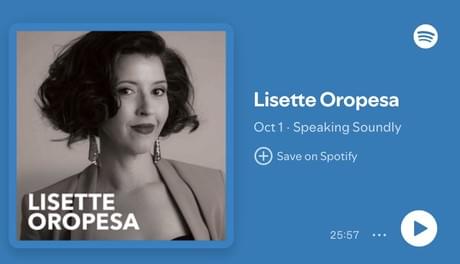Recital
Soloists
| Soprano | Lisette Oropesa | |
| Piano | Ken Noda |
About
For her Carnegie Hall recital debut, American soprano Lisette Oropesa performs a distinctive program of works by Cuban, French, and Italian composers. Carnegie Hall audiences will recognize Oropesa from recent performances with The Met Orchestra (as soloist in Brahms’s German Requiem and concert arias by Mozart). To hear her spectacular voice in the intimacy of Zankel Hall will be a special experience. She is joined by fellow Metropolitan Opera veteran Ken Noda, a renowned concert pianist and one of the finest vocal accompanists.
Program
ROSSINI "L'invito" from Les Soirées musicales
RAVEL "Chanson espagnole"
RAVEL Vocalise-étude en forme de habanera
DELIBES "Les filles de Cadix"
MASSENET "Chanson andalouse"
MASSENET "Sévillana"
VERDI "Merci, jeunes amies" from Les vêpres siciliennes
NIN - 4 Selections from 20 cantos populares españoles
Montañesa, Tonada del Conde Sol, Malagueña, Granadina
LECUONA "Romanza de María" from María la O
SÁNCHEZ DE FUENTES "Tú"
ANCKERMANN "Flor de Yumurí"
ROIG "Entrada de Cecilia" from Cecilia Valdés
BIS:
MEYERBEER "Robert, toi que j'aime" from Robert le diable
CHAPÌ "Carceleras" from Las Hijas de Zebedeo
BELLINI "Casta diva" from Norma
Media
Casta Diva - Carnegie Hall - 2024

🍂 2024 - Fall Newsletter
Welcome to my Fall 2024 Newsletter!

Interview - Speaking Soundly
Lisette is interviewed by Met Opera Principal Trumpet, David Kraus on his podcast, Speaking Soundly
Reviews
Castanet diva
One of the striking features of the program was how quickly and seamlessly Oropesa could turn on a dime from extroverted vocal display to quiet introspection or sensuous languor in the more serious song selections. The timbre would morph from diamantine brilliance to a darker silver tone with a cool luster depending on the music.None— Eli Jacobson • Parterre
A Rare Recital by a Rare Voice
The opening song, Rossini’s “L’invito” from Les soirées musicales, embodies a plea to a distant lover to come and join the singer, but here it functioned as a compelling invitation to an evening of vocalism by demonstrating the gorgeous state of Oropesa’s soprano. The lovely purity and resonance one remembers from performances here are coupled with greater fullness and depth of tone, which enhance her interpretations of the lyrical operatic repertoire and may one day lead to more dramatic fare. In any case, the flowing middle section of “L’invito” sounded especially luscious.None— George Loomis • Musical America
Crítica: Recital de Lisette Oropesa y Ken Noda en el Carnegie Hall
El cierre de la primera mitad con “Merci, jeunes amies” de Les vêpres siciliennes de Verdi fue quizás uno de los momentos más logrados de la primera mitad de la velada. El aria requiere de un artista excelente en lo vocal y lo interpretativo, y son muchos los aficionados que tienen las versiones de cantantes legendarias del pasado como referencias acaso inalcanzables para los cantantes de hoy. No obtante, Oropesa demostró que es una de las mejores cantantes de hoy, supo mostrar la ambigüedad emocional del personaje de Hélène, y no perdonó sus famosos sobreagudos, trinos y grupettos. El resultado convenció plenamente al público de Nueva York.The closing of the first half with "Merci, jeunes amies" from Verdi's Les vêpres siciliennes was perhaps one of the most accomplished moments of the evening's first half. The aria requires an artist who is excellent both vocally and interpretively, and there are many enthusiasts who hold the versions by legendary singers of the past as perhaps unattainable references for today's singers. However, Oropesa proved she is one of the best singers today, adeptly conveying the emotional ambiguity of the character Hélène, and she did not shy away from her famous high notes, trills, and gruppettos. The result fully convinced the New York audience.— Carlos J. López Rayward • Opera World


